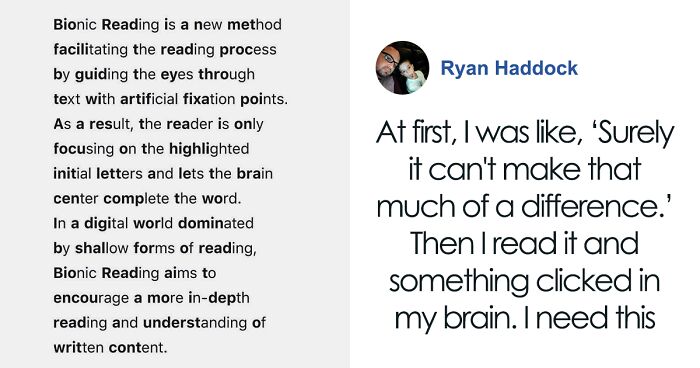
People Feel Like They’re “Unlocking 100% Of Their Brains” By Using The Bionic Reading Font
Interview With OwnerReading can be such a pain at times. I’m pretty sure you’d agree with me, dear Pandas, as most of you have probably rushed off to get your quickest fill of information possible with the least amount of exertion. Understandable. A wall of words takes a lot of effort to scale, and yet, there are many techniques that help us rush through and absorb the information hidden within at a quicker pace.
So tell me, is it easier for you to read this, compared to the first paragraph? Did you completely skip it to begin with? It’s fair enough, but do tell me in the comments as Iam acurious cat. Or acurious panda, should Isay…
This boldening of specific letters is called Bionic Reading, a technique designed to help people read and absorb information more easily and efficiently. Though revolutionary for some, it’s more of a headache trigger for others. Let’s dive into the details!
Also, if you upvote the story and follow me, It’ll make my day. M’kay, thanksies!
More info: Bionic Reading
Bionic Reading is a special font designed to help you focus, read faster and better retain all that you’ve read
Image credits: juan
I don’t think there’s much debate about the fact that reading is one of the core skills we as people must possess in order to understand and contribute to our respective societies. Harappa Education notes that reading engages various parts of your brain, exercising it in a sense.
From increasing analytical abilities, it fires up the imagination and stimulates memory centers of your mind. It helps recall information as well as stabilize your emotions, yet, like most exercise, it can get quite exhausting quite quickly.
Especially when the literature itself is complex or dry. And let’s not forget people with dyslexia or those struggling to focus for long periods of time.
The idea was born in 2009, whilst founder Renato Casutt was studying to become a typographic designer. It started taking shape in 2016
Image credits: Andy Roberts (not the actual photo)
Thankfully, smarter people than myself have found techniques and skills that can be developed to make reading as painless as possible, whilst also being able to absorb all the tasty knowledge hiding in the fancy words.
One of those is called Bionic Reading, a font tool which was thought of and created by Renato Casutt. The main goal – help you stay focused and help you read faster, whilst retaining all you’ve read.
The idea was born in 2009, whilst Renato was studying to become a typographic designer. He told Bored Panda that when he was asked to design a book for a Swiss bestselling author, he noticed something fascinating.
The author had written the book in a form of the Swiss language, which he could not comprehend when reading it, but understood absolutely fine when listening to it being spoken. “By listening, my brain knew this language very well,” Renato explained. “But when I read it, that was gone, because we absorb textual information through the eye. I then realized what the reason for this could be – I had never read in this language, so my brain didn’t have a vocabulary that it could match.”
6 years later we are introduced to the prototype, which allows you to control the amount of bolding on the letters to achieve the best result
Image credits: NatalieMaynor (not the actual photo)
Renato realized that he needed only a small fragment of the word to reprogram his brain and say, “‘hey, you know a very similar word, so use that because it has the exact same meaning!” He then converted each word to what we know now as the Bionic Reading fond and could suddenly read and understand the whole text.
He knew he was onto something and after a few years, Bionic Reading started to be developed in 2016.
“Bionic Reading revises texts so that the most concise parts of words are highlighted,” the company’s website states. “This guides the eye over the text and the brain remembers previously learned words more quickly.”
They believe that by bolding the first part of the word, we’re more quickly able to move from word to word, as our brains don’t need to work as hard to grasp their meanings because they just fill in the rest of the unbolded space.
“I’m doing something completely outside the box,” Renato states. “Breaking old patterns and discovering new things. I think it would be nice if typographic know-how is used to reinterpret possibilities. Future needs origin.”
“What looks so simple now is based on a matrix I designed to make Bionic Reading available as an individual reading method,” Renato explained
Image credits: Eugene Kim (not the actual photo)
“What looks so simple now is based on a matrix I designed to make Bionic Reading available as an individual reading method,” Renato explained. “We see technological progress as an opportunity for all those who want to increase the pleasure of reading in a noisy and hectic world in a focused way and without distraction.”
Whilst this is still in the testing phase, people who’ve tried it have had mixed reactions. Some seemed to be able to fixate and follow the words easier than before. “This is amazing! I have ADHD and I didn’t even realize that I was having trouble fixating when I read,” wrote one person.
“My eye latches right on to the bold face. Can’t wait to try reading a book again. It’s been all audiobooks for a while.” Another wrote, “It’s incredible how reading this feels like finally unlocking 100% of your brain.”
Whilst some found it revolutionary, making texts much easier to comprehend and get through, others found it irritating and distracting
Image credits: ESwift (not the actual photo)
If you’d like to try it for yourself, Bionic Reading has a free text converter on its website
Image credits: Christine (not the actual photo)
Personally, I found it more difficult to read with the font on, as for whatever reason, it was distracting and almost required more effort to focus. Some people agreed – it was not for them. But it does lead to an interesting insight into the different ways we perceive and absorb written information.
If you’d like to try it for yourself, Bionic Reading has a free text converter on its website. A YouTube clip from the company shows off the possibilities for how the font can be adjusted to individual preferences, so you can go crazy and find what works best for you.
Image credits: Mark Freeman (not the actual photo)
If this doesn’t work for you, no worries! There’s plenty more techniques that help you focus and read more quickly
Image credits: Sarah (not the actual photo)
However, this might not rock your world and that’s more than okay. There are many other techniques to try as well as negative habits to become aware of that might be slowing you down.
According to Daniel Strongin, when we first learn how to read, we’re taught to vocalize words, leading to further subvocalization in our minds, which ends up slowing us down.
A slow narrator is the number one way to fall asleep and lose track of what you’ve been reading. Try tactics like humming or chewing gum to stop the habit, or place your finger on your lips to subconsciously quiet the busy mind.
From skimming pages, to reading the beginning and end of paragraphs, to reading quicker than your brain is able to understand – pick & choose!
Image credits: Brad Greenlee (not the actual photo)
One way to increase your reading speed is to read at a faster pace than you can understand. Sounds counterintuitive, as your retention of the text will decrease at the beginning. To see improvement, you’ll need to practice so your brain can keep up. This trains you to recognize words at a faster rate.
Skimming text is another method to try. It’s based around omitting details from your reading and just getting a general sense of what it’s about. So skim the page, read headlines, the opening sentence of each paragraph, look at pictures and diagrams if they’re there, and with practice, you’ll be able to select important and unimportant parts.
And lastly, if you want to try something gnarly, try reading one of the previous paragraphs by focusing on the spaces between the words rather than the words themselves. It’s crazy but it works.
It’s incredibly interesting how differently we perceive the written word, but it’s fun that there’s innovation to help us read more easily
Image credits: Joe Goldberg (not the actual photo)
Regardless of which technique works for you, we can agree that the more innovation there, the better. There’s millions of books to read, thousands of blog posts and recipes to follow, so the easier and quicker we can grasp the information, the better.
“We know that this is just the beginning,” Renato said. “We have the path in front of us. But the end is still a long way off.” And we cannot wait to see what’s to come next!
Have a look at all the features currently present in the Bionic Reading interface
Leave your thoughts in the comments below. Which technique works best for you? Would Bionic Reading improve your day-to-day life?
Have a great day, you lovely pandaranda!
People have expressed their mixed opinions on the innovation. What do you think? Leave your thoughts in the comments
179Kviews
Share on FacebookI loved the Bionic text, so damned stress free. I wasn't gonna bother reading the whole text on the left hand side. I just whizzed thru the right hand text like I only had a simple text to read. Was crazy level relaxing to take it all in.
Ikr, I just read half of it and switched over and I was like 😳🙂
Load More Replies...This is wild. I don't know that I read faster or slower, but it was so relaxing for my tired eyes. I literally felt my eye muscles relax. When I went back to the original font, it was physically painful for my eyes.
It made my eyes relax too! I have added, and for some reason I was able to read so much faster without missing anything. Super cool!
Load More Replies...It's not for me. It feels like listening to the radio with someone fiddling with the volume k**b.
I loved the Bionic text, so damned stress free. I wasn't gonna bother reading the whole text on the left hand side. I just whizzed thru the right hand text like I only had a simple text to read. Was crazy level relaxing to take it all in.
Ikr, I just read half of it and switched over and I was like 😳🙂
Load More Replies...This is wild. I don't know that I read faster or slower, but it was so relaxing for my tired eyes. I literally felt my eye muscles relax. When I went back to the original font, it was physically painful for my eyes.
It made my eyes relax too! I have added, and for some reason I was able to read so much faster without missing anything. Super cool!
Load More Replies...It's not for me. It feels like listening to the radio with someone fiddling with the volume k**b.

 Dark Mode
Dark Mode 

 No fees, cancel anytime
No fees, cancel anytime 






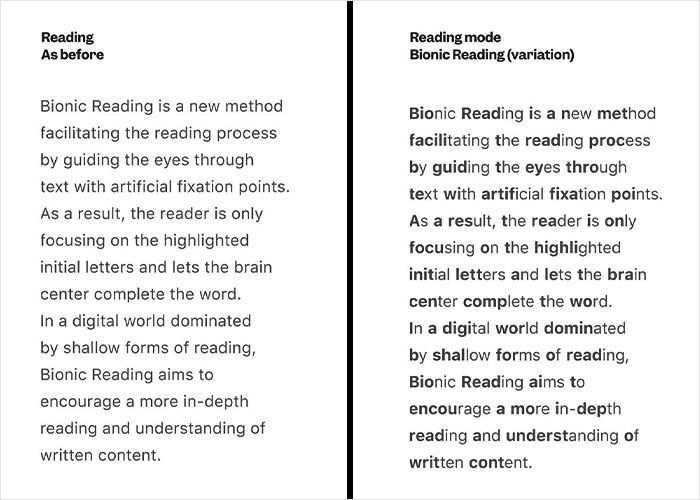
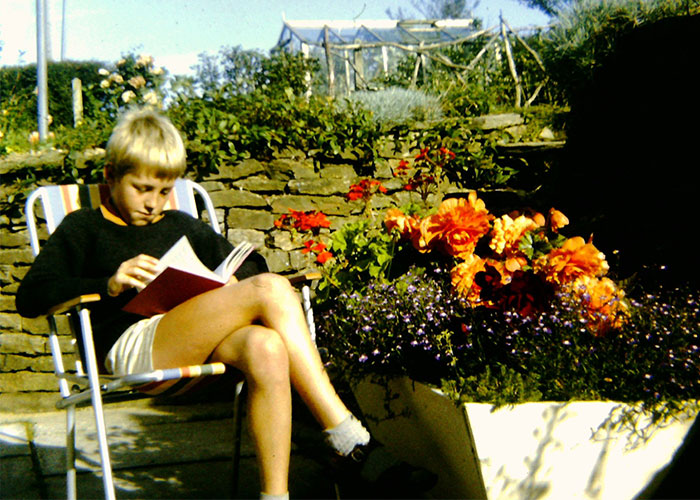


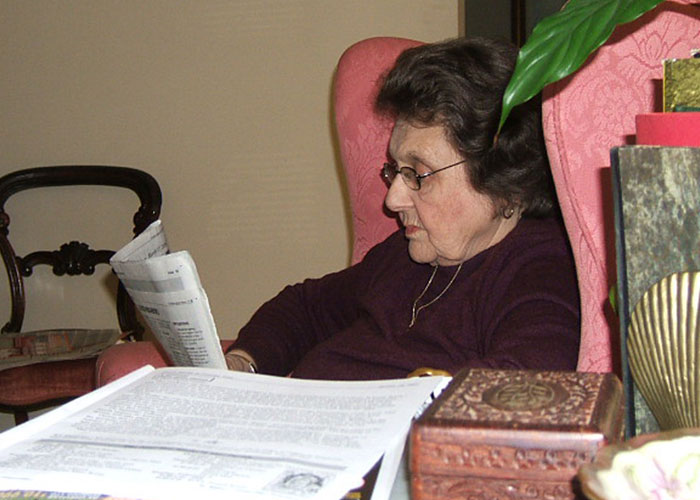

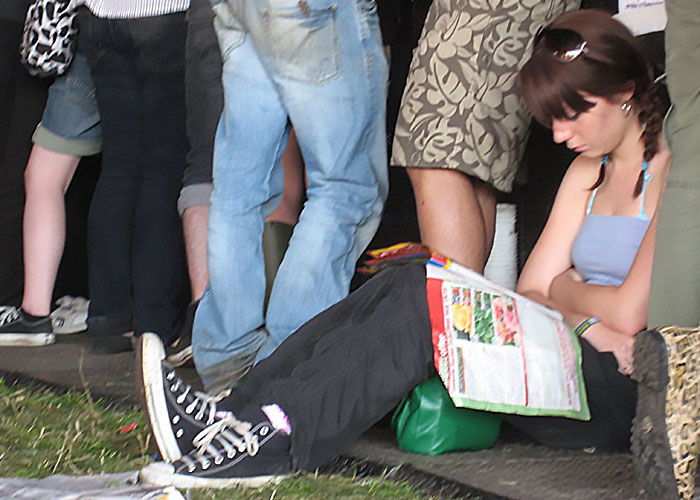
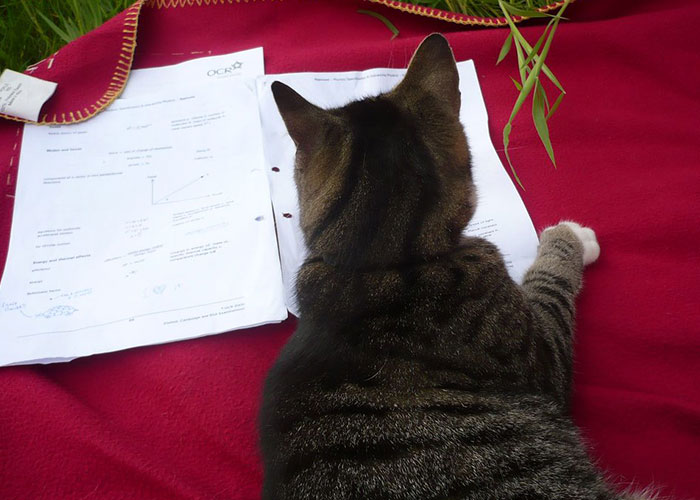

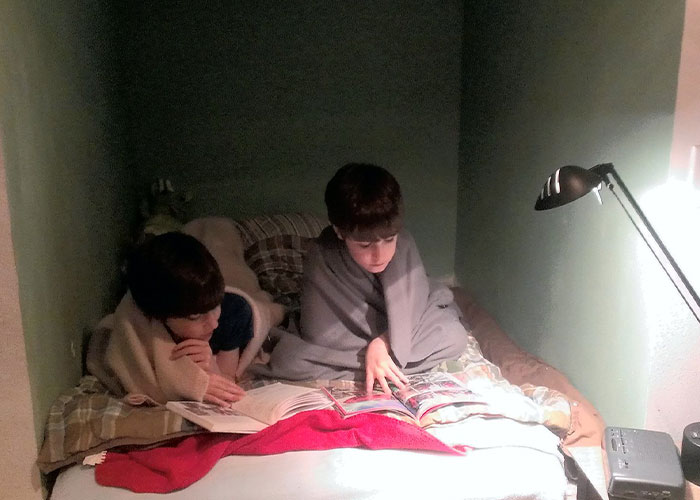
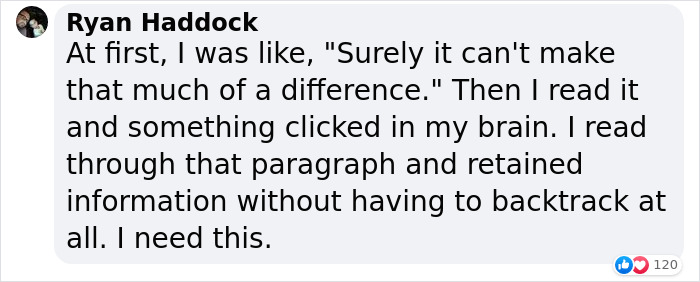


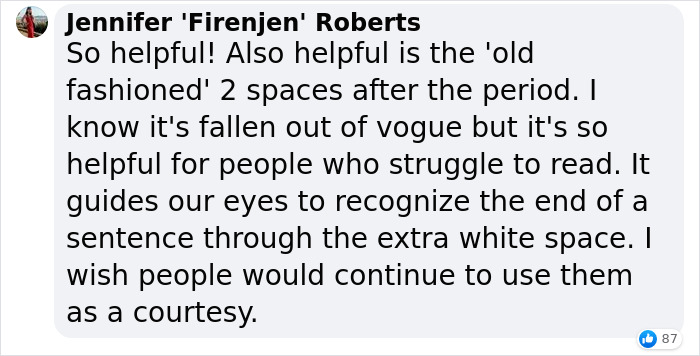

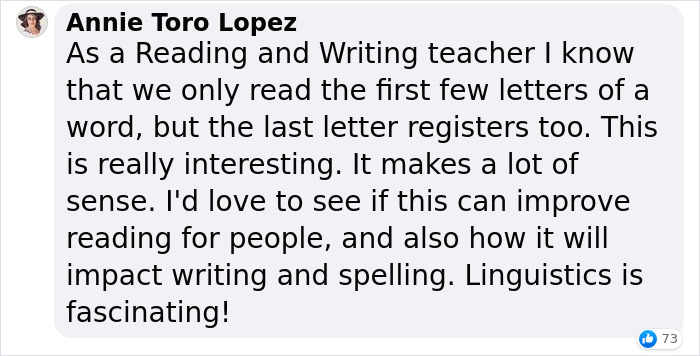
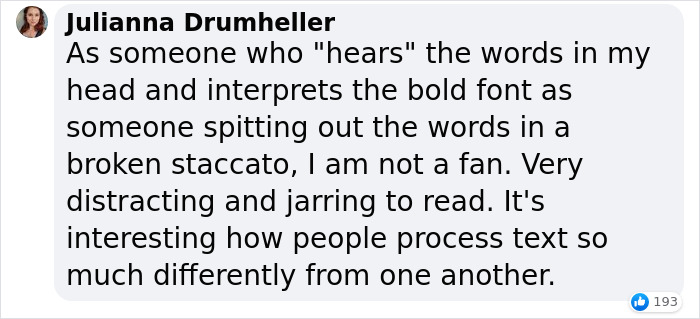
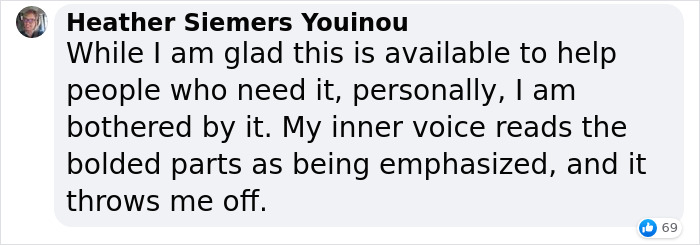
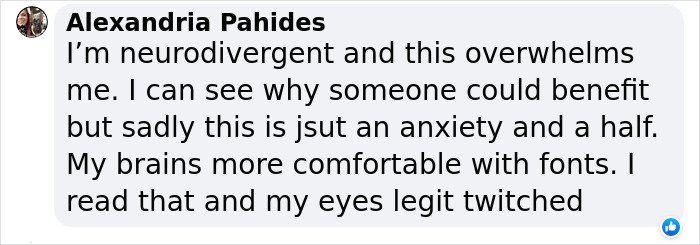

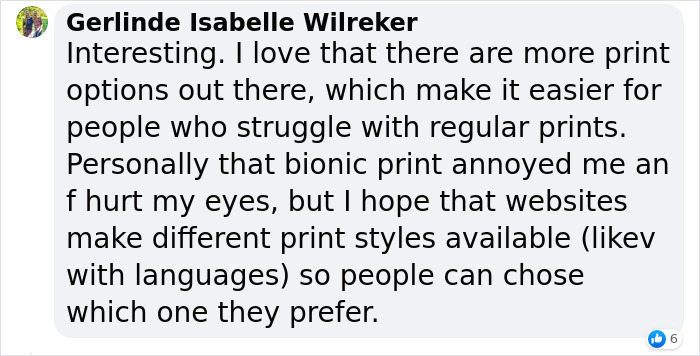
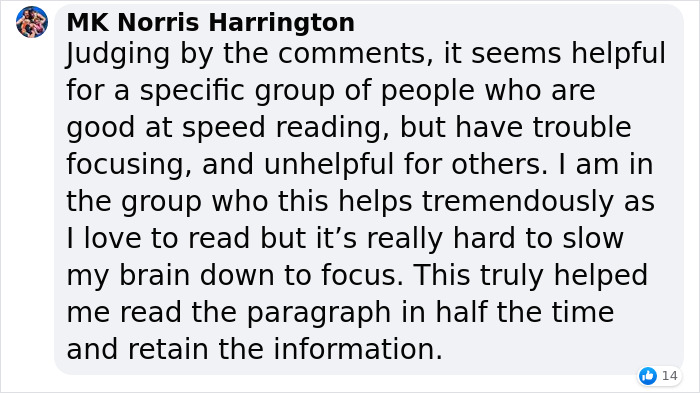




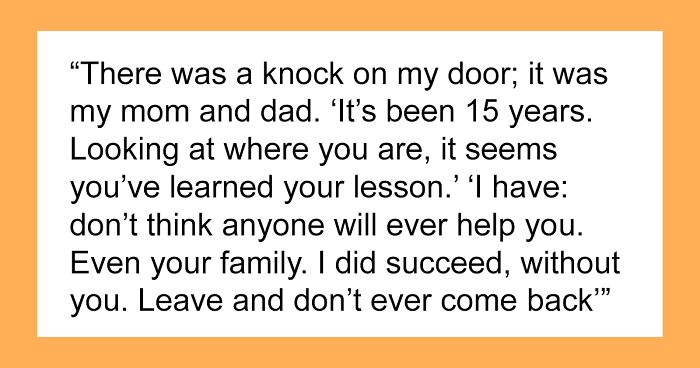



























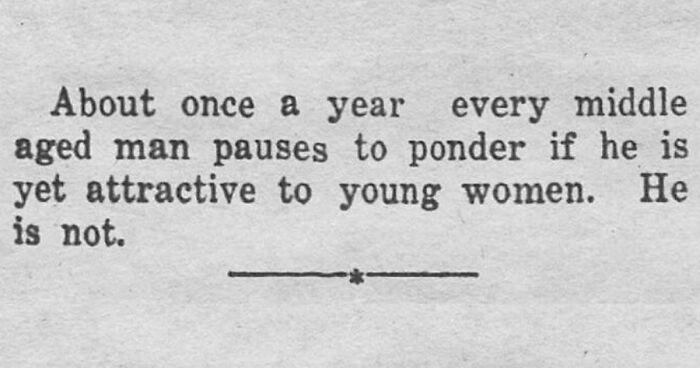










164
89